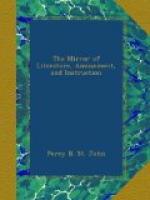* * * * *
DEATH OF QUEEN CAROLINE.
When very near her end, she inquired of one of the physicians in attendance, “How long can this last?” “Your Majesty will soon be eased of your pains,” was the reply. “The sooner the better,” said the Queen: and she then most fervently engaged in extempore prayer. Shortly afterwards, she twice desired that cold water might be thrown over her, to support her strength, while her family put up a final petition in her behalf. “Pray aloud,” said she, “that I may hear you.” She then faintly joined them in repeating the Lord’s prayer; and, at its conclusion, calmly laid down, waved her hand, and expired.
* * * * *
GEORGE THE SECOND.
At one period, while the Duke of Newcastle was in power, in the reign of George II. many serious complaints were made relative to the settlement of public accounts. The King, at length, became acquainted with the alleged grievances, and warmly remonstrated with the Duke on his carelessness and inattention; protested that he was determined, at once for his own satisfaction and that of his aggrieved people, to look into the papers himself. “Is your Majesty in earnest?” asked the Duke. The King replied in the affirmative, and the Duke promised to send him the accounts. At an early hour on the following morning, the King was disturbed by an extraordinary noise in the courtyard of his palace, and, looking out of the window, he perceived a cart or a wagon laden with books and papers, which, on inquiry he found had been sent by the Duke of Newcastle. Shortly afterwards the minister himself appeared, and the King asked him what he meant by sending a wagon-load of stationery to the palace. “These are the documents relative to the public accounts,” replied his grace, “which your Majesty insisted on examining; and there is no other mode of forwarding them except by carts or wagons. I expect a second load will arrive in a few minutes.” “Then, my Lord Duke,” replied the King, “you may make a bonfire of them for me. I would rather be a galley-slave than go through the rubbish; so away with it, and countermand the cart which you say is coming; but pray let me hear no more complaints on this subject.”
On another occasion, he sent, in a fury, for the duke’s brother, Mr. Pelham, and inquired, in a coarse and angry manner, why the civil list had not been paid. Pelham replied that he had been compelled to use the money for some public and more important purpose. The King, however, would not admit of this excuse; and swore, if the arrears were not instantly paid, he would get another minister. “I am determined,” said he, “not to be the only master in my dominions who does not pay his servants’ wages.” One day, it appears that he was actually without a shilling in his pocket; for it is related that a half




